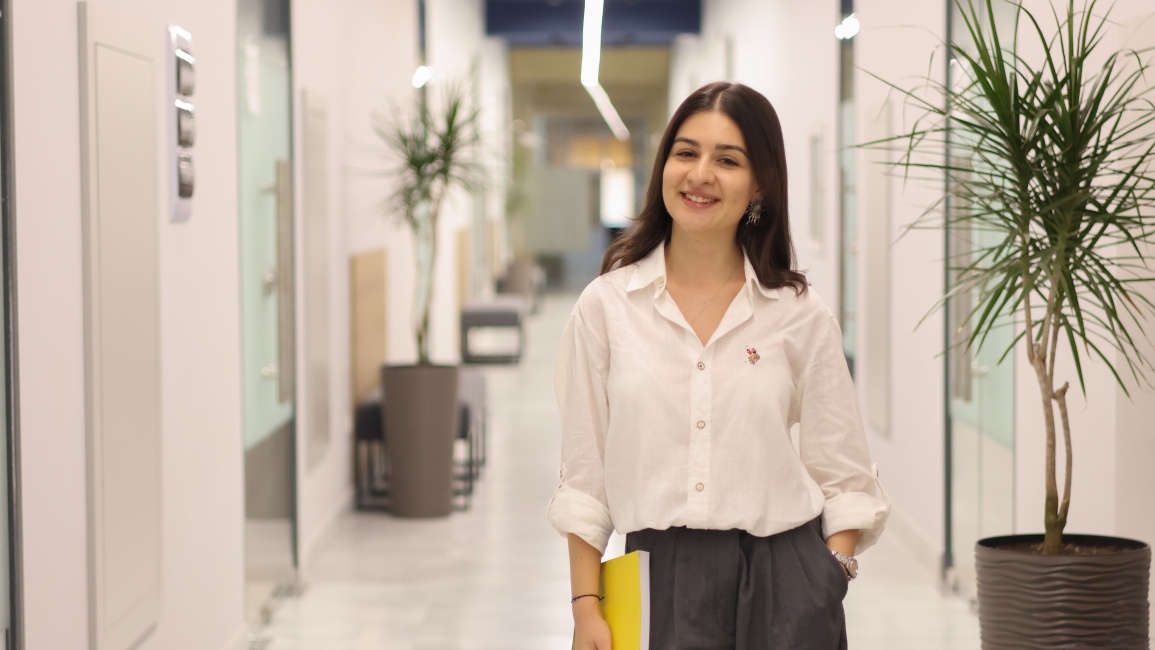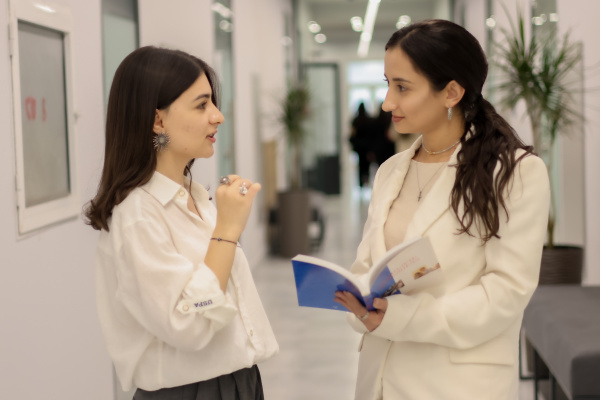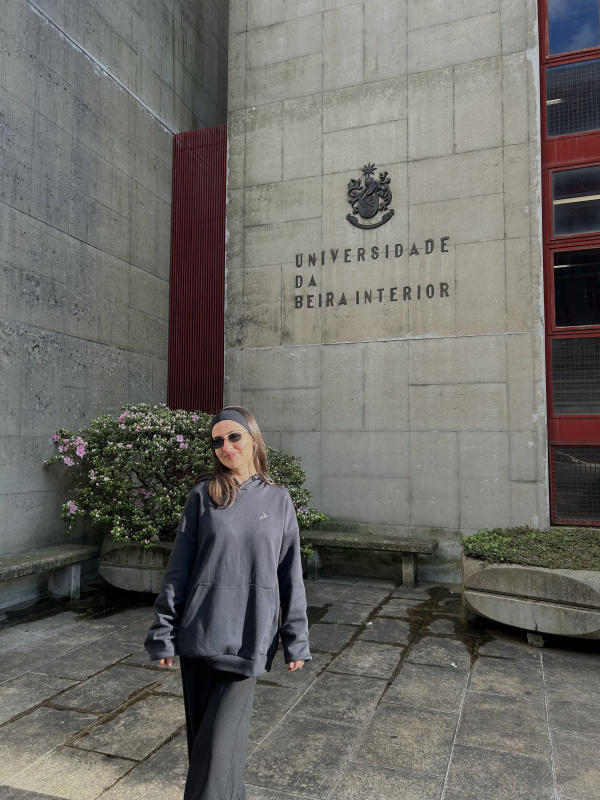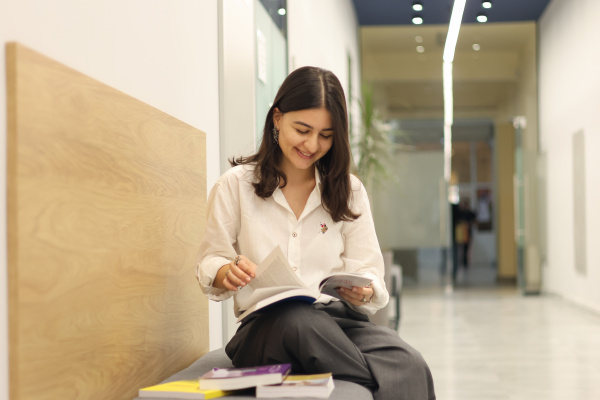October 02, 2025 | 11:13
Education
Student
YSU student on her academic journey, international experience, and future goals
Anna Muradyan, a 4th-year undergraduate at YSU Faculty of Philosophy and Psychology, shared about her academic journey, emphasizing student-centered learning, non-formal education, and international experience as key to her personal and professional growth. "At YSU, I had the opportunity to deeply explore the field of psychology, build close friendships, and fulfill a lifelong dream—studying abroad," said the student, who studied at the University of Beira Interior in Portugal through the Erasmus+ exchange program.

We spoke with YSU student Anna Muradyan about her semester in Portugal, participation in international programs, and the value of gaining new knowledge and skills. It’s interesting to see how today’s student prepares for the challenges of tomorrow, inspiring her peers along the way.
– Anna, you studied abroad through the Erasmus+ exchange program. What was that experience like for you?
– As part of the exchange program, I studied at the University of Beira Interior in Covilha, Portugal—one of the top-ranked universities globally. It's hard to sum up the experience in just one word. The semester abroad included academic classes, new knowledge, and even a few "everyday adventures."
You’re not just learning academic subjects—you’re learning to manage everything on your own, from the simplest day-to-day matters to adapting to a new environment.
– What courses did you take, and were they new to you?

– My main focus was on psychology courses, which allowed me to deepen my understanding of two of my favorite fields: organizational and clinical psychology. Additionally, I chose to take courses on a foreign language and on the sociology of culture and communication.
Although the subjects were not entirely new to me— many of them were somewhat familiar—I can certainly say there's always something new to learn. Each course gave me the opportunity to approach familiar topics from a different angle, gain both theoretical and practical knowledge, and better understand the local culture while sharing my own.
– In your view, were there differences between the two universities in terms of how education is organized?
– In terms of teaching, there weren’t any major differences—the lectures and seminars followed a similar structure to what we have at YSU, with a student-centered approach. The differences were more noticeable in assessment methods and social aspects.
Exams were quite rigorous, often requiring essay-type responses, logical analysis, and situational thinking, which made them both challenging and engaging.
On the social side, students participated in numerous activities that encouraged communication, helped build friendships, and fostered a sense of community. At the end of the semester, the university organized a special dinner for all Erasmus+ students, celebrating a successful academic year—another example of their strong student-focused approach.

– What new knowledge and skills did you gain during your semester abroad, and how did they contribute to your professional development?
– During my semester studying in Portugal, I had the opportunity to focus on the subjects I am truly passionate about, which allowed me to deepen my understanding in the areas that genuinely motivate me. In addition to this, I was able to access new academic resources and literature that broadened my intellectual horizons and provided me with valuable tools to advance professionally. Equally important was the fact that I completed numerous individual assignments, which helped me develop my analytical thinking, enhance my ability to make decisions on my own, and foster a strong sense of responsibility.
Altogether, this experience significantly contributed to my professional development and gave me the confidence that I’m on the right path.
– As a participant in the Erasmus+ program, what challenges did you face, and how did you overcome them?
– This was one of several experiences I have had. For nearly three years, I have been actively participating in similar programs, and each time I gain new experiences and valuable knowledge. However, going to a foreign country alone always comes with its own challenges and difficulties.
First, due to visa issues, I was delayed by two months and missed classes, but the host university welcomed me warmly and helped me catch up on what I had missed. Next came the challenge of making new friends and becoming part of the community. At first, everything seemed difficult, but putting my introversion aside, I took a step forward and moved ahead.
New acquaintances quickly formed and soon developed into strong friendships. Most importantly, I navigated this entire journey without external support, which I believe became my greatest achievement—learning to trust that even in the most difficult situations, I can manage independently.
– How would you describe the student–lecturer relationships at the host university? Were there any notable differences compared to YSU?
– I didn’t notice any significant differences. In both universities, student–lecturer relationships are based on collaboration, respect, and mutual trust. This kind of environment makes the learning process not only effective but also enjoyable and inspiring.
– What values and factors do you consider important in education? What role has YSU played in your achievements?

– For me, it’s essential that a university be genuinely student-centered. Education should go beyond lectures. It’s important to have events and creative initiatives that allow students not just to study, but to truly live their student years. In this regard, non-formal education plays a major role, helping students develop skills such as communication, teamwork, and creativity. I believe a university should be a place where students’ voices are heard—a space where they can grow, express themselves, and connect their academic knowledge with their dreams and goals.
At YSU, I’ve had the chance to explore my chosen profession in depth, take courses in other fields, making close friends, and achieve a long-held dream—studying abroad. I believe education is truly successful when it provides not just knowledge, but also lasting memories that accompany you through life.
– What are your future goals? Are you planning to continue your education?
– One of my main goals is to become a leading specialist in organizational and management psychology—specifically in the field of human resources. I plan to pursue a master’s degree abroad in this area, where I can gain deeper knowledge, international experience, and further develop my professional skills.

